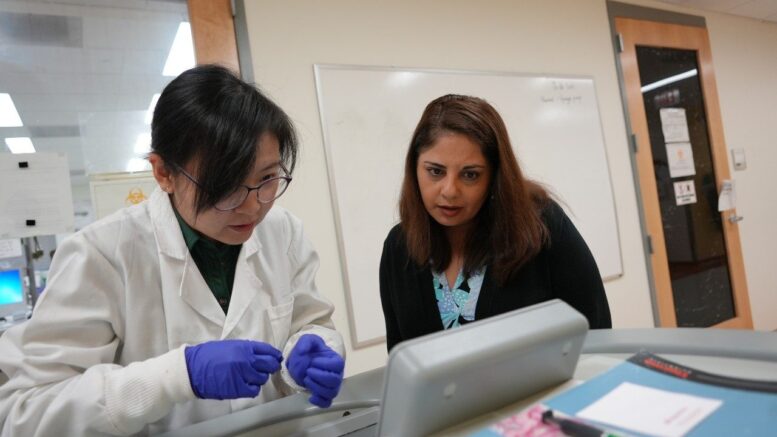Bahareh Behkam and collaborators have received a $2 million grant from the National Science Foundation (NSF) to continue their fight against airborne pathogens.
An associate professor of mechanical engineering, Behkam and her team will use the funding to further develop engineered living systems for indoor air monitoring. Currently, there is a lack of sensitive, specific, affordable, and easy-to-use airborne pathogen monitoring technology and an overwhelming need for innovative approaches to address this challenge.
“Many of the emerging pathogens are transmitted by air, COVID-19 being a good example,” said Behkam, the John R. Jones III Faculty Fellow in the College of Engineering. “Beyond pathogens, there are also harmful chemicals and bioterrorism agents that we are concerned about, but affordable and sustainable living sensors that can do detection in the air was an area that was understudied and underdeveloped area.”
Titled “Programmable Nano-Bio-Hybrid Living Systems for Continuous Monitoring of Airborne Pathogens,” this project crosses disciplines to integrate bio-hybrid microbotics, synthetic biology, nanotechnology, infectious disease transmission, bacterial genetics, biosecurity, safety, and ethics.
The project’s main goal is to develop a device that continuously monitors the presence of various airborne pathogens and captures them within bacterially produced engineered living materials. Mobile bacteria-based sensors constantly survey the engineered living material matrix, looking for the captured pathogens of interest. Once detected, the bacterial sensors produce a human-detectable signal recognizable to the public as a threat.
Behkam received the grant through the NSF's Emerging Frontiers in Research and Innovation program, which funds interdisciplinary projects that propose transformative solutions to critical national needs. Her lab, the Micro/NanoScale Biotic/Abiotic Systems Engineering Laboratory, previously developed bio-hybrid engineered systems for disease detection and targeted therapy.
She is collaborating with both Virginia Tech and Johns Hopkins University researchers:
- Linsey Marr, Charles P. Lunsford Professor and University Distinguished Professor
- Anna Duraj-Thatte, assistant professor of biological systems engineering
- Zhaomin Yang, professor of biological sciences
- David Gracias, professor of chemical and biomolecular engineering at Johns Hopkins University
- Gigi Gronvall, associate professor of environmental health and engineering at Johns Hopkins University
The grant will help the project move smoothly through its various phases, but it could not have reached this stage of development without seed funding. In February, Bekham received an Engineering Faculty Organization-Opportunity (EFO-O) grant from the Institute for Critical Technology and Applied Science (ICTAS).
“Our team was excited about our idea, but we concluded that we didn’t have enough data to convince the reviewers that our approach was actually going to work.” Behkam said. “So in that regard, the EFO-O was really helpful in producing the key pieces of data to add to our proposal.”
Such seed grants support transdisciplinary projects led by Virginia Tech engineering faculty and increase the chances of success for subsequent proposals for external funding, while also supporting ICTAS’ work as an investment institute.
Mary Kasarda, associate professor of mechanical engineering and ICTAS’ faculty director of scholarship, said the institute has received positive feedback from faculty about how the EFO-O seed grant has helped research teams generate pilot data that strengthened successful external proposals and how the grant supported exploration of high risk/high return ideas for new collaborators resulting in new discoveries, partnerships, and research opportunities.
Source: Virginia Tech
